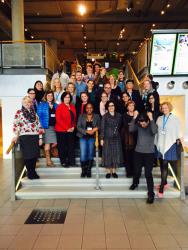Andrea Troncoso
In the city of a million bikes, Amsterdam, the Hypatia Project had its Kick-off meeting at the beginning of November. The 18 project’s partners met at the Science Centre NEMO to discuss strategies and to set the ground for the work that will be done on the coming years. Partners came from 15 different countries, and once the first day was over, everyone shared treats from their countries...it was a delicious moment!
The new €1.5 million EU Horizon 2020-funded project will address the challenge of gathering different society actors around bringing more teenage girls into STEM careers, meaning Science, Technology, Engineer and Maths, as its main objective. In this challenge, schools, science centres and industries play a major role.
But why? Europe’s knowledge economy developing and the new technologies that are yearly arising, make the need for more students in STEM careers a must. The Hypatia project wants to reach teenage girls and boys, teachers, head teachers, policy makers, researchers, industries, science centres and museums, with innovative and effective ways of creating awareness and interest in these STEM areas.
But aren’t schools enough to foster these interests? Unfortunately not. At least, not yet. Research is constantly showing that the way sciences are communicated to young people, in and out of school, are not gender inclusive. That turns into practices where unconscious and conscious actions leave permanently teenage girls out of the STEM fields. What’s more, male and female teenagers still have little idea of the variety of STEM careers and the relevant skills for these paths.
One of the most important outcomes of the project will be the development of a toolkit, with different and practical activities that will help three main groups, teachers, museums and industry, carrying out gender inclusive activities. Building upon the latest social research on gender and STEM, Hypatia will also look at former EU and non-EU projects that have addressed similar issues, gathering and adapting the outcomes, in order to have a user friendly platform for all stakeholders, in the shape of the toolkit. A series of events and seminars will complement the online resources of this project
Regarding the teenagers, with special focus on girls between 13-18 years old, Hypatia is considering the achievements of the EU campaign “Science is a girl thing”, and will create a new campaign, were girls will be addressed in a refreshing, proactive and creative way.
The Hypatia website will be coming soon.

